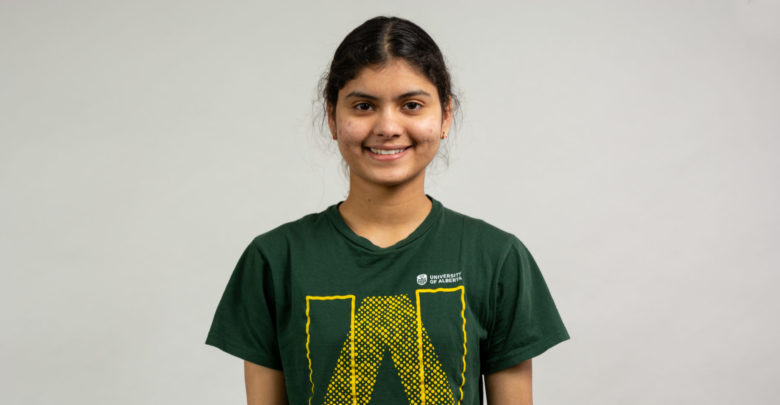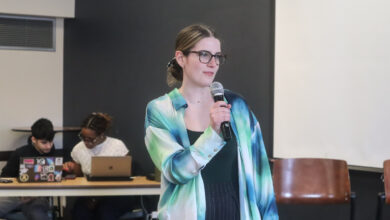 Lochlann Kerr
Lochlann KerrEach year, The Gateway publishes an evaluation of the Students’ Union Executive and the Board of Governors representative. It’s impossible to discuss every aspect of their tenures, so these reports are largely based on the major components of the platform each executive campaigned on, and the most significant responsibilities of their respective positions.
And if you’re short for time, check out our TLDR for a bite-sized breakdown.
Gurleen Kaur: C+
The vice-president (academic) (VPA) is in charge of all academia-related advocacy, focusing on the issues that impacts students’ studies on campus.
Kaur’s advocacy is mostly centered around accessibility for students and marginalized groups on campus. Kaur built off the work of previous executives and advocated for exploration credits. As a part of the Students’ Union’s (UASU) truth and reconciliation goals, Kaur advocated for mandatory Indigenous course content. As well, Kaur was the first international student to serve as a UASU executive, which provided her with a different perspective when it came to advocacy.
Navigating truth and reconciliation in academics
In our interview, I asked Kaur how her passion for Indigenous activism played out in her term. In her answer, she mentioned mandatory course content and incorporating Indigenous students in UASU policy.
Throughout her campaign, Kaur was a passionate and vocal advocate for Indigenous issues on campus. She emphasized advocating for reconciliation, and uplifting Indigenous students in forums. Unfortunately, these goals appear to still be underway, and very few tangible changes have been made so far.
Mandatory Native studies has been discussed at the university for a number of years. It was assigned to her as an Aboriginal Relations and Reconciliation Committee (ARRC) recommendation. In our interview, Kaur noted that as she worked on completing this goal, many changes were advised and brought in by Florence Glanfield (vice-provost Indigenous programming and research). Instead of mandatory Native studies, Kaur said students can now expect mandatory course content.
Kaur said that Glanfield wanted to move in this direction, because moving towards mandatory Native studies would be a “very hard transition.”
I worry, however, that mandatory Indigenous course content might not do the subject matter justice. Many professors do not have the capabilities, knowledge, or expertise to teach this information at all.
Regardless, this project is still in the early stages, and probably won’t come to be until after Kaur’s term ends. Unfortunately, this also means that Kaur won’t be able to complete her ARRC recommendation before she leaves her role.
However, Kaur is still making small strides in the larger conversation of reconciliation on campus in her advocacy. She’s been advocating to the International Students Association (ISA) to see how much Indigenous content they’re including in things like orientation for incoming international students. This stood out to me, as many international students have limited knowledge of the history of Indigenous people in Canada.
“I am asking them to integrate something so all the international students who come from a different area know which land they are going on and what the history is.”
It’s hard to know when this will be brought in. If done well, however, this is an admirable step in reconciliation within Kaur’s own community.
Exploration credits: Will a long-awaited UASU advocacy goal finally become a reality?
Exploration credits were the primary focus of Rowan Ley, former UASU president, and Abner Monteiro, former VPA and current president, last year. This year, Kaur has largely continued this work in collaboration with Monteiro.
The idea behind exploration credits was that students could take courses in areas they weren’t as familiar with, or didn’t necessarily excel in, without damaging their GPA.
Both Ley and Monteiro promised that students could expect to see exploration credits in the 2022-23 academic year, which unfortunately, didn’t end being true.
Unfortunately, according to Kaur, many faculties weren’t on board, and responded to the plan with exemptions that largely limited the options available to students.
As a result, exploration credits stalled in the General Faculties Council (GFC) earlier this year, which both Monteiro and Kaur sit on. According to Kaur, there were communication gaps between the UASU, the registrar’s office, and the different faculties.
Her role throughout it all was supporting the registrar’s office in their talks with the different faculties, she said. Similar to last year, Kaur said students can expect to see exploration credits in the fall 2023 semester.
Students have been expecting this project for some time. If exploration credits don’t become a reality soon, this will be a massive disappointment on the part of the UASU.
If she can get exploration credits off the ground, it will be a longstanding win, and greatly improve the quality and diversity of education that students receive. With course registration for the upcoming fall and winter semesters fast approaching, we can only hope that Kaur is successful. If she was unable to complete this section of her portfolio, her grade would be much lower.
Improving accessibility on campus through academic accommodations
When it comes to Kaur’s work as VPA, it seems like she has had many discussions about the issues students face, but struggled to actually solve them. This is a common theme in her work of improving accessibility on campus.
When I asked Kaur what platform points she felt wouldn’t be completed by the end of her term, she named academic advising.
Because of academic restructuring, many issues that Kaur has communicated to the university won’t be solved anytime soon. She said that she’s communicated these issues, and that the university has acknowledged them and agreed to fix them. However, this acknowledgment isn’t enough. Students deserve more than just an agreement that things will eventually, maybe, get resolved.
In the interview, we discussed her plans of improving the accommodations system, which is notoriously inconvenient to students. Kaur said she conveyed students’ concerns, and that the Dean of Students is working on solving these issues. There’s no way to be sure whether or not this will actually come to be, or if this is just a false promise from the university.
She said that many of her promises would happen soon, but it’s impossible to tell. A large focus of her term has been advocacy and talking to students about issues they’ve faced, but what tangible changes have been made, and what can be attributed to her?
Unfortunately, it seems like Kaur built off the work of her predecessors for many of these projects, but that’s about it.
I would have liked to see more from Kaur that actually came to be true, as opposed to just ideas. Beyond advocacy, what did Kaur actually complete in her platform? Advocating for students is great, but in order to achieve actual change, you need to take charge.
TLDR: Kaur has continued the work of previous VPAs, but has largely failed to actually finish any of them. While Kaur was previously working on mandatory Native studies, this has now shifted into mandatory Indigenous course content, which is still in the early stages. Exploration credits, which have been promised to students for a couple years, are now set for the fall 2023 semester — however, they were delayed once, and who’s to say that won’t happen again?
A-range: This person has fulfilled the promises they campaigned on and more, has created tangible change during their tenure, and has shown a commitment to improving the lives of students. Their GPA is top tier.
B-range: This person has done their job consistently well, but has not made any remarkable changes, or has fallen short on important goals they set out in their platforms. They’re doing fine, but it’s nothing to phone home about.
C-range: This person has done their job sufficiently, but has failed to make significant progress in the areas most relevant to their portfolio, or has essentially abandoned a major part of their platform. They’re still passing with a safe buffer though, and Cs get degrees!
D-range: This person has done a very lacklustre job, and has not sufficiently fulfilled their campaign promises or the responsibilities of their position.
F-range: This person has not done their job, has not represented students, and has not fulfilled their campaign promises whatsoever.




